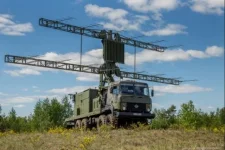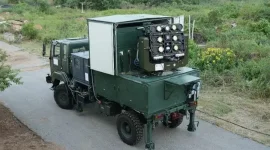- Views: 5K
- Replies: 12
India's domestically developed anti-drone system, known as the Drone Detect, Deter, and Destroy system (D4S), is gaining significant international attention following its successful operational performance.
Developed by the Defence Research and Development Organisation (DRDO) and manufactured by Bharat Electronics Limited (BEL), the D4S has established itself as a significant advancement in modern defence technology.
Its recent effectiveness in countering drones reportedly supplied by Turkey and deployed by Pakistan has validated its combat capabilities, leading to numerous inquiries from other nations, according to a DRDO official.
This growing interest highlights India's emerging leadership in the field of defence innovation.
The D4S system, India's pioneering indigenous solution against hostile unmanned aerial vehicles (UAVs), provides comprehensive 360-degree airspace monitoring. It is engineered to identify, track, and neutralize a variety of drone threats in real-time, including small and micro UAVs often used for illicit activities.
The system employs a sophisticated two-pronged neutralization strategy: a "soft kill" option that disrupts the drone's communication and navigation by jamming its radio frequency (RF) signals, Global Navigation Satellite System (GNSS) links, and spoofing its GPS.
For more direct engagement, it features a "hard kill" laser-based weapon to physically disable or destroy the target. Operators are supported by detailed optical and thermal imaging, along with an RF spectrum display, allowing for precise threat identification and response.
In a recent flare-up on the India-Pakistan border, the D4S demonstrated its capabilities by effectively neutralizing drones, reportedly of Turkish origin, operated by Pakistani forces. These unmanned aircraft are typically employed for reconnaissance, delivering payloads, or testing Indian air defence preparedness.
The D4S system successfully rendered these threats ineffective using its advanced non-kinetic (electronic warfare) and kinetic (laser-based) disabling techniques. This real-world combat success has cemented the D4S's reputation as a dependable defence against contemporary aerial threats, drawing comparisons to globally recognized systems like Israel's Iron Dome for its protective capabilities.
Produced by BEL as part of the 'Make in India' initiative, which encourages domestic manufacturing, the D4S system has already been integrated into all three branches of the Indian Armed Forces: the Army, Navy, and Air Force.
Following its proven success in operational scenarios, BEL is reportedly preparing to supply additional units to the Indian Army, particularly for deployment in sensitive border areas.
The system's adaptability is a key feature, with configurations available for fixed installations as well as vehicle-mounted mobile units, catering to diverse operational requirements from safeguarding critical infrastructure to providing defence on the move in conflict zones.
The development of such systems also addresses the increasing use of drones for smuggling arms and narcotics across borders.
The considerable international curiosity surrounding the D4S system underscores India's advancing capabilities in defence technology and innovation.
Nations confronting similar challenges from hostile drones, whether from state-sponsored entities or non-state groups, are showing keen interest in acquiring this technology.
A DRDO official has confirmed the system's strong export potential, which could position India as a significant supplier in the expanding global counter-UAV market.
This achievement is in line with India's overarching policy of 'AatmaNirbhar Bharat' (self-reliant India) in defence production, while also demonstrating the country's capacity to develop and offer sophisticated, cutting-edge defence solutions to the international community.
The global anti-drone market is projected for continued growth as drone technology becomes more accessible and threats evolve.


